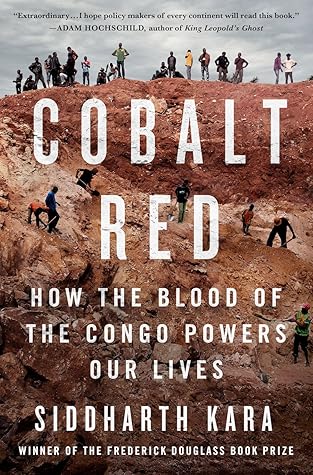More on this book
Community
Kindle Notes & Highlights
Read between
October 3 - October 9, 2025
the loss of life during Leopold’s control of the Congo is estimated to be as high as thirteen million people, a sum equal to half the population of the colony at the time.
As of 2022, there is no such thing as a clean supply chain of cobalt from the Congo. All cobalt sourced from the DRC is tainted by various degrees of abuse, including slavery, child labor, forced labor, debt bondage, human trafficking, hazardous and toxic working conditions, pathetic wages, injury and death, and incalculable environmental harm.
“Please tell the people in your country, a child in the Congo dies every day so that they can plug in their phones.”
Artisanal mining techniques can yield up to ten or fifteen times a higher grade of cobalt per ton than industrial mining can. This is the primary reason that many industrial copper-cobalt mines in the DRC informally allow artisanal mining to take place on their concessions, and it is also why they tend to supplement industrial production by purchasing high-grade artisanal ore from depots.
the two boys, ages thirteen and fourteen, started walking with their sacks of cobalt stones in the opposite direction of the COMMUS depots to try to earn more than the pittance they were being paid by the depot agents. The COMMUS security guards promptly gunned them down.
“The artisanal cobalt has a higher grade than cobalt mined mechanically, so it is necessary for the mining industry to have artisanal mining.
the consequences of displacement due to mining operations were always the same—exacerbated poverty, increased hardship, and growing desperation.
solely blaming the Chinese seemed too convenient. The Chinese, for instance, were not responsible for all the money that went missing from taxes and royalty payments to the Congolese government or for the government’s failure to equitably distribute revenues from the mining sector to the poorest people of the Copper Belt.
Perhaps some cooperatives operated as these three officials described, but from everything I had learned, CMKK, COMIKU, and COMIAKOL seemed to serve little function other than to enrich their powerful owners while allowing everyone up the chain to claim that the cobalt from their operations was produced without child labor or hazardous working conditions.
The lack of government support of public education in the DRC is an inexplicable failure that severely exacerbates levels of poverty and child labor in the country.
“Every time I go in the tunnel, I wonder if I will see my sons again.”
believe he understood that he was living on borrowed time. Each day he repaid his debt to Jacques and Régis, his debt to the dead grew. One day, they might settle the account. He was compelled nevertheless to delve underground in search of blue gold. Money and death were served together in Kasulo; the diggers could not have one without the other.
This was the final truth of cobalt mining in the Congo: the life of a child buried alive while digging for cobalt counted for nothing. All the dead here counted for nothing. The loot is all.
How can a sustainable future be built through sacrificing the very bearers of that future, through depriving children’s well-being, and worse even, through depriving children the right to be?


